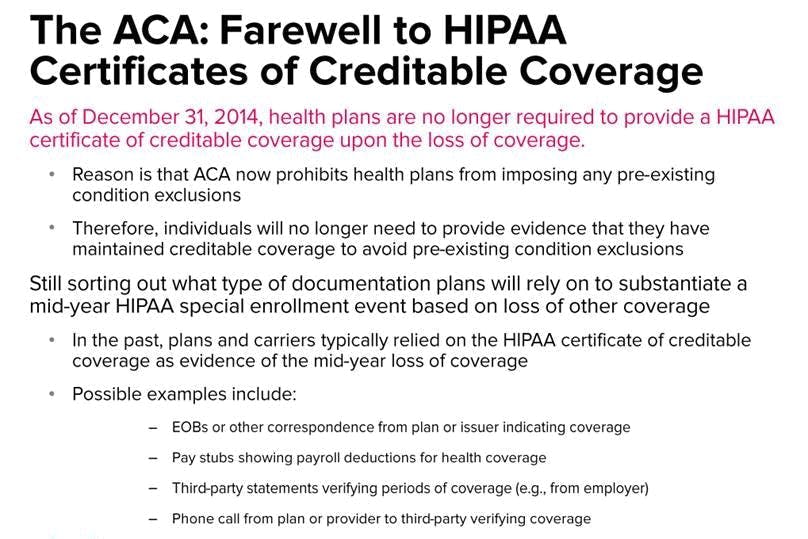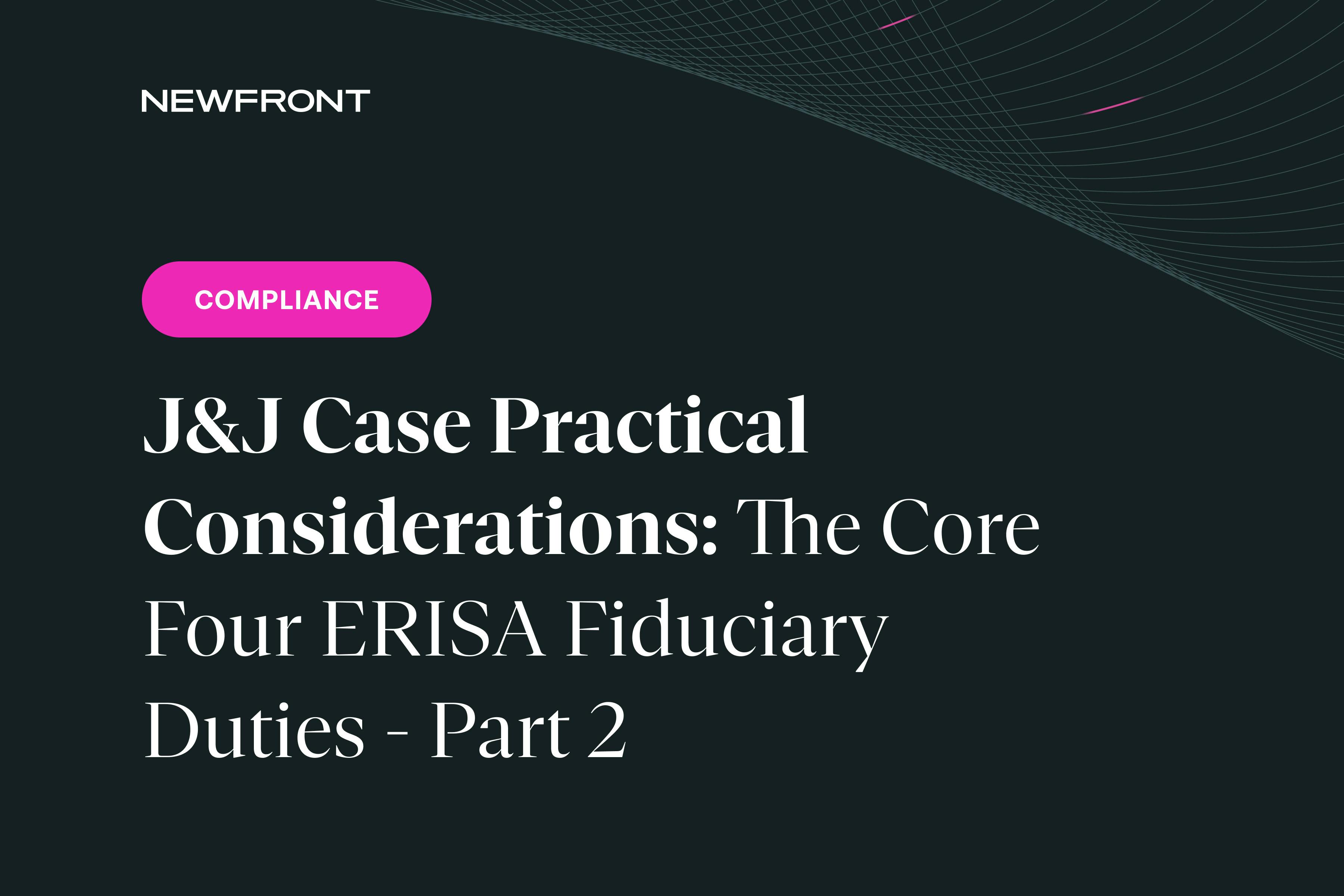Documenting Prior Coverage after HIPAA Certs
By Brian Gilmore | Published September 14, 2018
Question: How should employers respond to requests for a HIPAA certificate of creditable coverage to document prior coverage through the employer’s group health plan?
Compliance Team Response:
The HIPAA certificate of creditable coverage is no longer a required notice. The certificate was eliminated at the end of 2014 because its primary function was to address pre-existing condition exclusions (PCEs). The ACA has since prohibited all PCEs, which is why the certificate is no longer required.
Nonetheless, it’s not uncommon for employers to receive requests for documentation of prior coverage. This most common situation is when a former employee attempts to enroll mid-year in a spouse’s, domestic partner’s, or parent’s plan after terminating and experiencing a HIPAA special enrollment event caused by the loss of coverage. Many employers still request proof of the date of loss of prior coverage, which in the past was easily handled by the required HIPAA certificate of creditable coverage.
In some cases the insurance carrier (fully insured) or TPA (self-insured) will still provide a document resembling the old certificates of creditable coverage. That would be the first resource to check in this situation.
If not, the employer can provide a letter on its letterhead stating when coverage under the employer-sponsored group health plan terminated. There is no issue with modeling that letter after the HIPAA certificate of creditable coverage. However, we do not recommend labelling it as a HIPAA certificate or including the information relating to HIPAA portability rights (which are now obsolete). There is a sample of the old HIPAA format available here.
If the employer is not willing to provide a letter on its letterhead verifying the period of the employee’s coverage, there are other alternatives. The old HIPAA regulations (now obsolete and removed post-2014) included a list of documents that could corroborate an individual’s period of creditable coverage. That list remains a good source for documentation alternatives today.
Examples of alternatives include:
EOBs or other correspondence from the plan or issuer indicating coverage
Pay stubs showing payroll deductions for health coverage
Third-party statements verifying periods of coverage (including from the employer)
Phone call confirmation from the plan, employer, carrier, or TPA verifying coverage
Health ID cards
Records from medical providers indicating coverage
Regulations
29 CFR §2590.701-5 (Prior to December 31, 2014)
(3) Evidence of creditable coverage—
(i) Consideration of evidence—
(A) A plan is required to take into account all information that it obtains or that is presented on behalf of an individual to make a determination, based on the relevant facts and circumstances, whether an individual has creditable coverage. A plan shall treat the individual as having furnished a certificate under paragraph (a) of this section if—
(1) The individual attests to the period of creditable coverage;
(2) The individual also presents relevant corroborating evidence of some creditable coverage during the period; and
(3) The individual cooperates with the plan’s efforts to verify the individual’s coverage.
(B) For purposes of this paragraph (c)(3)(i), cooperation includes providing (upon the plan’s or issuer’s request) a written authorization for the plan to request a certificate on behalf of the individual, and cooperating in efforts to determine the validity of the corroborating evidence and the dates of creditable coverage. While a plan may refuse to credit coverage where the individual fails to cooperate with the plan’s or issuer’s efforts to verify coverage, the plan may not consider an individual’s inability to obtain a certificate to be evidence of the absence of creditable coverage.
(ii) Documents. Documents that corroborate creditable coverage (and waiting or affiliation periods) include explanations of benefits (EOBs) or other correspondence from a plan or issuer indicating coverage, pay stubs showing a payroll deduction for health coverage, a health insurance identification card, a certificate of coverage under a group health policy, records from medical care providers indicating health coverage, third party statements verifying periods of coverage, and any other relevant documents that evidence periods of health coverage.
(iii) Other evidence. Creditable coverage (and waiting or affiliation periods) may also be corroborated through means other than documentation, such as by a telephone call from the plan or provider to a third party verifying creditable coverage.
29 CFR §2590.701-5 (Current)
(a) In general.
The rules for providing certificates of creditable coverage and demonstrating creditable coverage have been_** superseded by the prohibition on preexisting condition exclusions**_. See §2590.715-2704 for rules prohibiting the imposition of a preexisting condition exclusion.
(b) Applicability.
The provisions of this section apply beginning December 31, 2014.
Farewell to HIPAA Certificates of Creditable Coverage
As of December 31, 2014, health plans are no longer required to provide a HIPAA certificate of creditable coverage upon the loss of coverage. The reason is the ACA now prohibits health plans from imposing any pre-existing condition exclusions. Therefore, individuals will no longer need to provide evidence that they have maintained creditable coverage to avoid imposition of pre-existing condition exclusion
In short, the HIPAA certificate of creditable coverage is no longer relevant in this phase of the ACA implementation, and therefore the Departments have eliminated the requirement to provide the document.
One open question is what type of documentation employees will rely on to substantiate a mid-year HIPAA special enrollment right based on loss of other coverage. Many plans and carriers previously relied on the HIPAA certificate of creditable coverage as evidence of the mid-year loss of coverage.
DOL EBSA HIPAA FAQ:
https://www.dol.gov/agencies/ebsa/about-ebsa/our-activities/resource-center/faqs/hipaa-compliance
While HIPAA previously provided for limits with respect to preexisting condition exclusions, new protections under the Affordable Care Act now prohibit preexisting condition exclusions for plan years beginning on or after January 1, 2014. For plan years beginning on or after January 1, 2014, plans are no longer required to issue the general notice of preexisting condition exclusion and individual notice of period of preexisting condition exclusion. Plans are also no longer required to issue certificates of creditable coverage after December 31, 2014. These amendments were made because plans are prohibited from imposing preexisting condition exclusions for plan years beginning on or after January 1, 2014.

Brian Gilmore
Lead Benefits Counsel, VP, Newfront
Brian Gilmore is the Lead Benefits Counsel at Newfront. He assists clients on a wide variety of employee benefits compliance issues. The primary areas of his practice include ERISA, ACA, COBRA, HIPAA, Section 125 Cafeteria Plans, and 401(k) plans. Brian also presents regularly at trade events and in webinars on current hot topics in employee benefits law.
Connect on LinkedIn


